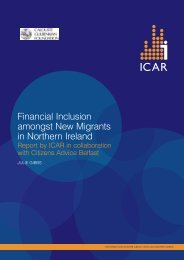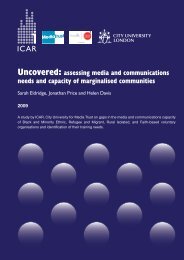Navigation guide Refugee populations in the UK: Algerians - ICAR
Navigation guide Refugee populations in the UK: Algerians - ICAR
Navigation guide Refugee populations in the UK: Algerians - ICAR
Create successful ePaper yourself
Turn your PDF publications into a flip-book with our unique Google optimized e-Paper software.
Key issues<br />
The most significant issues fac<strong>in</strong>g <strong>the</strong> Algerian community <strong>in</strong> <strong>the</strong> <strong>UK</strong> can be grouped <strong>in</strong>to eight categories:<br />
asylum, undocumented status, detention and deportation, employment, isolation, <strong>the</strong> effects of anti-terrorist<br />
legislation, contact with Algeria and <strong>the</strong> growth of <strong>the</strong> Algerian population <strong>in</strong> <strong>the</strong> <strong>UK</strong>.<br />
Asylum<br />
The large majority of <strong>the</strong> Algerian population <strong>in</strong> <strong>the</strong> <strong>UK</strong> (estimates range from 70% to 90%) has arrived over<br />
<strong>the</strong> last ten years, dur<strong>in</strong>g <strong>the</strong> period of conflict. The conflict is likely to have affected everyone <strong>in</strong> Algeria.<br />
Most people are likely to know someone who has been killed or <strong>in</strong>jured, many have witnessed <strong>the</strong> deaths of<br />
friends and family and many more recount scenes of astonish<strong>in</strong>g barbarity. The most press<strong>in</strong>g need for this<br />
population is <strong>the</strong>refore for a secure period of residency elsewhere.<br />
• Apart from <strong>the</strong> years 1998 and 1999, on average, <strong>Algerians</strong> were less likely to receive asylum <strong>in</strong><br />
<strong>the</strong> <strong>UK</strong> than o<strong>the</strong>r national groups.<br />
• Many <strong>Algerians</strong> would prefer a shorter period of protection s<strong>in</strong>ce <strong>the</strong> symbolic break with <strong>the</strong> home<br />
country that is associated with refugee status deters many people from apply<strong>in</strong>g. 82<br />
• The French system of ‘B-status’ ‘territorial asylum’, which lasts for a limited time and carries fewer<br />
benefits than full Convention status was tailor made for <strong>the</strong> Algerian population.<br />
• Both territorial asylum, <strong>in</strong> France and Exceptional Leave to Rema<strong>in</strong> (ELR), <strong>in</strong> <strong>the</strong> <strong>UK</strong> have very<br />
rarely been applied to <strong>Algerians</strong>; figures vary between one per cent and four per cent, depend<strong>in</strong>g<br />
on <strong>the</strong> year. 83<br />
• In 2003, <strong>the</strong> <strong>in</strong>troduction of two new forms of subsidiary protection <strong>in</strong> <strong>the</strong> <strong>UK</strong> (humanitarian<br />
protection and discretionary leave) to replace ELR has not affected <strong>the</strong> proportion of <strong>Algerians</strong> who<br />
are granted subsidiary protection.<br />
This <strong>in</strong>formation po<strong>in</strong>ts to a very significant ‘protection gap’ for <strong>the</strong> Algerian population. Many <strong>Algerians</strong>, if<br />
refused asylum, prefer to rema<strong>in</strong> undocumented than risk return<strong>in</strong>g to Algeria and more than half <strong>the</strong><br />
Algerian population <strong>in</strong> <strong>the</strong> <strong>UK</strong> is thought to be undocumented. Asylum has a number of disadvantages for<br />
<strong>Algerians</strong>:<br />
• The Algerian government has suggested that those people who are granted asylum <strong>in</strong> Europe are<br />
more likely to be terrorists or deserters. 84 This is often repeated by undocumented <strong>Algerians</strong> as a<br />
reason for not claim<strong>in</strong>g asylum. Many are concerned what <strong>the</strong>ir family will th<strong>in</strong>k of <strong>the</strong>m if <strong>the</strong>y tell<br />
<strong>the</strong>m that <strong>the</strong>y have claimed asylum. The director of <strong>the</strong> Algerian <strong>Refugee</strong> Council commented:<br />
82 Collyer, M. (2002) ‘Expla<strong>in</strong><strong>in</strong>g change <strong>in</strong> established migration systems: <strong>the</strong> movement of <strong>Algerians</strong> to France and<br />
<strong>the</strong> <strong>UK</strong>’ University of Sussex, DPhil <strong>the</strong>sis, bound and recorded at <strong>the</strong> British Library; this po<strong>in</strong>t is also commonly made<br />
<strong>in</strong> French literature on Algerian asylum requests e.g. GISTI (1999) Les droits des Algériens en France, Les cahiers<br />
juridiques. GISTI, Paris.<br />
83 Home Office statistical bullet<strong>in</strong>s; Amnesty International Section Française (1997) l’Asile en France, Etat des lieux,<br />
Paris; Delouv<strong>in</strong> (2000) ‘The Evolution of Asylum In France’ Journal of <strong>Refugee</strong> Studies 13(1), pp. 61-73.<br />
84 Benyam<strong>in</strong>a, A. (1998) ‘Foreign <strong>in</strong>terference <strong>in</strong> <strong>the</strong> situation <strong>in</strong> Algeria: The Algerian government’s position’.<br />
Cambridge Review of International Affairs 1998 vol. XI no.2, pp. 184 – 195.<br />
<strong>Navigation</strong> <strong>guide</strong> to refugee <strong>populations</strong>: <strong>Algerians</strong><br />
©<strong>ICAR</strong> 2004, moral rights Michael Collyer<br />
39

















